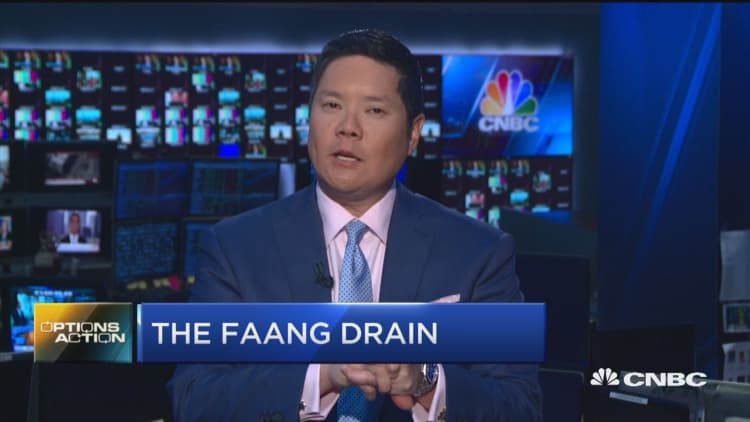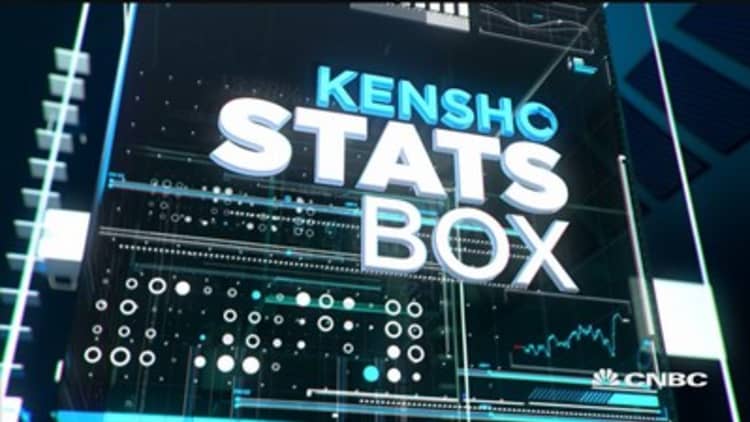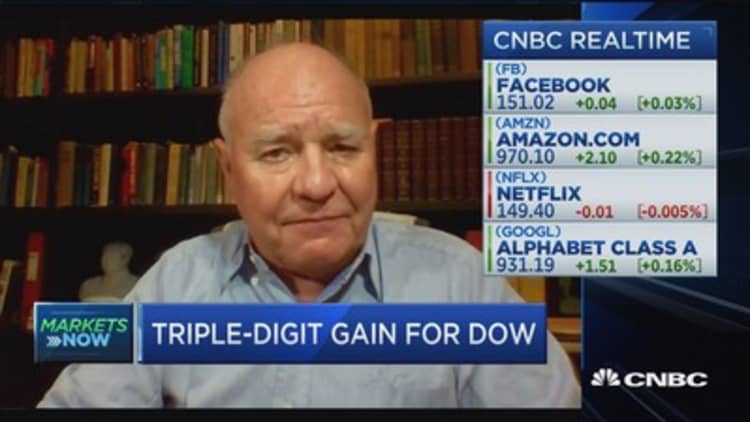The hot FANG stocks are often cited for having lofty valuations, but their fast growth in a slow growth world may help justify their high prices.
FANG's high-flying market success would make it an easy target for skittish profit-takers if the stock market heads south. But if you're worried about current stock market valuations, those companies with top line growth—or sales growth—more in line with share price growth may be a place to look.
The more common way to consider valuation is the price-to-earnings ratio, which simply stated, is the price of a stock divided by earnings per share.
But CNBC took a different type of look at the FANG stocks and a number of tech companies, and compared the expected year-over-year revenue growth for the June 30 quarter, to stock market gains during the year ending June 30.
FANG includes Facebook, Amazon, Netflix and Google parent, Alphabet.
Of the FANG names, Facebook's stock price looks like the most comfortable fit with its revenue growth. Revenue is expected to be up 42.7 percent in the quarter ended June 30, compared to the same period last year, and its stock price meanwhile, was up 36 percent for the year ending June 30.
Netflix is on the lofty side. Its stock price was up 64 percent for the year as of June 30, more than double the expected year-over-year quarterly sales growth of 31.3 percent for the second quarter. But when its revenue growth surged 32 percent, slightly better than expected, and its stock jumped another 10 percent on strong subscriber growth of 5.2 million—a sign of more revenue to come.
"If people are concerned about valuation, I would argue in some respects, especially for growth companies, what goes on in the top line is more important than earnings," said Scott Kessler, head of equity research at CFRA. Kessler said he has a buy on Facebook, but he's surprised that people tell him it's overvalued.

"Those companies trade at a perceived premium because they're continuing to drive top line growth that most expect eventually will fall to the bottom line. Those are the type of companies that people have been attracted to," Kessler said. Of Facebook, "For a $400 billion company, that's pretty awesome when most of the growth is organic."
James Paulsen, chief investment strategist at Leuthold Group, said FANG and other stocks like them are being rewarded with an extra premium because there is not as much growth as there had been in other cycles. He said it makes sense to look at their sales growth versus price appreciation, but he added the growth stocks may also be more insulated in a market sell off, unless there's an economic downturn.
"The real risk with them is the recovery ends, but a correction I don't think it's that fatal to those type of stocks," said Paulsen.
Of the other FANG names, Alphabet sales are expected to be up about 20 percent for the quarter, and its class A stock was up 32 percent, for the year ending June 30. Amazon's sales to market price is a bit more stretched. Its anticipated sales growth for the June quarter of 22.4 percent lags its one year share price gain of 36.9 percent.
Looking at a name like Microsoft, Kessler said the attraction is less clear. Its revenue for the June 30 quarter is expected to be up 7.4 percent from year ago, when it reports earnings later this week. For its fiscal year, ending on the same day, revenue is expected to be up about 5 percent. Yet its stock price is up about 36 percent in the 12 month period, ended June 30.
Apple's second quarter revenue is expected to be up 6 percent over last year's level, but its stock price is up 51.5 percent for the year ending in June. But Brian White of Drexel Hamilton said Apple's stock had fallen hard from its peak and was bottoming last summer, so the stock gain looks very strong comparatively.

The sales cycle year over year and the iPhone unit cycle, were negative last year, and the market was concerned about Apple growth, he said. Then Apple returned to overall sales growth and iPhone unit growth in the first quarter of fiscal 2017.
"Also this year, more investors started thinking about the iPhone 8 and the potential repatriation of cash under the new administration...I believe investors recognize that Apple will not succumb to the challenges of consumer electronic companies of the past, thus the valuation is still inexpensive," wrote White in an email. White is global head of technology hardware and software, equity research at Drexel Hamilton.
Daniel Niles, founding partner of AlphaOne Capital Partners, said he watches the revenue growth to share price metric as a useful way of monitoring companies, and it can act as a kind of early warning system that can throw up "yellow flags."
But in general, he said higher valuations for tech makes sense. "Of course it's more expensive, and you should be paying a lot more for something that's growing a lot faster."
Analysts say there could be some surprises this earnings period in tech, as summer often delivers some unpleasant surprises in the sector. Netflix, first out of the gate, was a pleasant surprise, and stocks like Netflix and other FANG names are often used as warnings that the stock market in general is getting overpriced.
"Overall the market, in general is expensive, it could always get more expensive," Niles said.
On a near term basis, he said valuations are not terribly overblown with the S&P 500 companies trading at an average P/E of 22, based on 10 year average of 17 times.
He said valuations, such as the Schiller cyclically adjusted P/E are the highest since the tech bubble of 2000, and also of 1929. Current levels at 32 times are still lower than the 44 times peak of the tech bubble and interest rates are more supportive now, he said.
CNBC's Josh Lipton and Christopher Hayes contributed to this report
WATCH: Marc Faber says FANG stocks seem vulnerable



